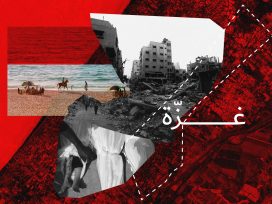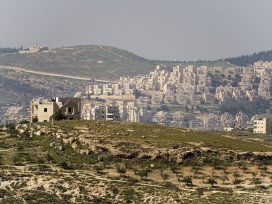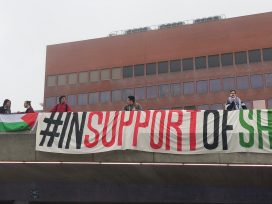I remember the exact moment when I realized that Jews weren’t who I thought they were. About thirty years ago I was watching a TV ad for El-Al Airlines, a pastiche of film clips each a few seconds long. There were Orthodox Jews with side curls praying in front of the Wailing Wall, bathing beauties parading before judges, muscular sabras farming on a kibbutz, people sitting in a café that looked more like Paris than Paris. None of the images fitted the conventional wisdoms in my head. Finally it dawned on me: Jews weren’t just the anxious Russian immigrants of my mother’s family; the liberal intellectuals of New York’s Upper West Side; the greedy “slum lords” who were said to be ripping off the poor people of Harlem. If the pictures in the ad were authentic, Jews were like anyone else – not noble or diabolical, not Left or Right. My “people” had no particular character at all.
On either a conscious or unconscious plane, it’s my sense that the existence of the state of Israel allowed other Diaspora Jews to explore their individual identities without feeling the need to fit the stereotypes of what Jews were “supposed” to be. Though there were plenty of Jews who defied these stereotypes before the creation of Israel, it was a riskier business. Nowadays it seems impossible to discern a Jewish “identity”, at least among American Jews – though an Israeli one may well exist, in the sociological sense that citizens of the same nation share cultural traits.
In the years since I saw that El-Al ad, the state of Israel evolved, not surprisingly, much along the lines of its neighbours. Like them, it was a construct of the dying British Empire, though one that would have been realized a lot sooner had it not been for the hesitation of Britain, which was charged with the partition of Palestine by the League of Nations in 1920. It became a touchy, aggressive, conservative country ready to contest every inch of land. Most dispassionate observers of the Middle East would find it hard to justify the cruel treatment of Palestinian refugees by the Israeli government and military, as well as the manipulative support of the US; but they would also be hard-pressed to regard Hezbollah and Hamas simply as idealistic revolutionary movements, or to ignore the neglect by the oil-rich Arab states of their poorer brothers and sisters.
Though more or less the same situation has existed for decades, the recent Israel-Lebanon crisis introduced new elements into the equation, both in terms of world opinion and the prospects for Israel’s survival. All of which, I suspect, have had deep effects on American – and other – non-Israeli Jews.
To put it bluntly: for the first time, Diaspora Jews have seen the possibility of the extermination of the Israeli state. Not only because of the increased range of Iranian rockets and sharpened skills of Hezbollah fighters, but because, as the US and its “coalition” have painfully learned in the Afghanistan/Iraq fiasco, it is clear that populist movements are not deterred by superior fire power or technology. With Iran and Syria behind Hezbollah, the possibility that Israel can be destroyed is real, if not imminent.
The shift of opinion in western European intellectual circles is equally distressing to Diaspora Jews. What is disturbing is not the suggestion that Israel return the West Bank or the Golan Heights to their rightful owners – these moves are necessary and long overdue – but the implication that in this crisis Israel crossed some kind of moral boundary line, and now must be… what? Disciplined? Dissolved? Retrained to be more peace loving and cooperative? Transformed from a theocracy to a multi-ethnic, multi-religious state where Zionism blurs into a more contemporary ecumenism? Though some of these alternatives are attractive, even desirable, the chances of their coming about are minuscule, and on some level they imply much more than disapproval of Israel’s actions. They imply that for some western Europeans, the state of Israel has outlived its historical usefulness, has become an imperial power, and should be disavowed by all peace-loving nations.
For underneath the tone of moral outrage (and an unstated anti-Americanism that ought to be addressed separately) is a kind of sentimental double standard, a reverse racism, a disappointed expectation that because of the troubles they’ve seen, Israelis, and Jews in general, should be nobler, more tolerant, nicer than others. It is a lovely fiction to think that suffering ennobles, but the whole history of Israel gives the lie to that fantasy. What its short, combative life tells us is that it has no interest in being the home of the Chosen People: quite the opposite – as a government, it is as truculent as its neighbours.
To be the Chosen People is a cliché that few Israelis, and Jews of the Diaspora, would these days take seriously, perhaps because, though its origins clearly lie in a sense of desperation and isolation, it holds them to an impossible standard of perfection. There may be satisfaction in thinking that you’re better than others – consider the Scandinavian pride in being more “peace loving” than the rest of the world – but to do so is to lock yourself into a stereotype whose very grandiosity implies its opposite.
Though it’s more difficult to regard the Israeli-Arab crisis as a political and diplomatic issue rather than a moral one, it’s much closer to the reality of the situation. Clearly it will take decades to unravel this conundrum, and partial solutions will include everything from the economic development of Palestine and Lebanon to the intermittent if not constant presence of UN troops.
But a real decision faces western European intellectuals. Can they divest themselves of old stereotypes about the Jewish “character”, and look at Israel as a Middle Eastern country far closer in behaviour to its neighbours than it is, say, to western Europe or the United States? Like other countries, Israel must be dealt with through realpolitik, not rhetoric, and like them – including the nascent Palestinian state – be supported in its continued existence.






